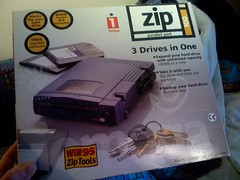
Now it's time to be amazed Google is giving anyone 1 GB of free online storage. As Mashable author Christina Warren points out, services like Dropbox and Box.net have been doing this for quite awhile. Drop.io continues to be one of my favorite online storage options, not only for its free/cheap cloud-based file access (depending on how much you want) but also its free phonecasting services. What does this abundance of free, online storage mean for teaching and learning today? It's time again to question some of our assumptions, and one of the big ones to question is the scarcity as well as cost of local as well as web-based storage space.
Just after the new year started, Karl Fisch tweeted me a link to Chris Anderson's June 2009 article, "Tech Is Too Cheap to Meter: It's Time to Manage for Abundance, Not Scarcity." In the article and his free eBook, "Free: The Future of a Radical Price," Anderson contends:
When scarce resources become abundant, smart people treat them differently, exploiting them rather than conserving them. It feels wrong, but done right it can change the world. The problem is that abundant resources, like computing power, are too often treated as scarce.It may seem odd to think this way, but as the author of "The Long Tail," Chris Anderson is an important voice to consider in our quickly changing infoverse. If we want to act smart (and of course we all do most of the time) we need to change the way we look at online storage. Start thinking of storage space online as abundant rather than scarce. Here are a few implications of this thinking and the behaviors which should follow.

WIFI CONNECTIVITY IS MORE IMPORTANT THAN EVER
The concept of cloud-based computing is a big shift for LOTS of people in our society today. Inside and outside our schools, ubiquitous access to our files and data "in the cloud" can be a great thing as long as we have available connectivity. This makes wifi hotspots in our schools, homes, and communities more important than ever. We don't need every city and town to be blanketed with high speed connectivity (although that would be nice, of course) but we DO need hot spots in each community which are readily accessible and FAST.

QUESTION MANDATES TO REQUIRE FLASH MEDIA DRIVES
Tomorrow I'm starting to teach a fifteen week course at the University of Central Oklahoma called, Technology 4 Teachers. In the past, and as far as I know in the other six sections of this course offered this term, students are required to purchase and use a 1 GB flash drive. In my sections, flash drives are optional. The vast majority of the work we'll do together this term will be "in the cloud." Why mess with a flash drive and a locally-saved file on a flash drive if you don't have to?

NETBOOKS LOOK BETTER EVERY DAY
Netbooks are perfect for cloud-based computing work. My comparison last week and weekend creating videos for YouTube using both iMovie '09 and Windows Live Moviemaker (for Windows 7 and Vista) confirmed what I'd long suspected: Today's 3rd generation netbooks can be used to produce creative multimedia videos as well as "work in the cloud." I think Storychasers' Mobile Learning Collaborative is right on target recommending that schools opt for netbooks rather than full-size laptops for 1:1 learning initiatives. The speed and power of netbooks are only going to increase in the months ahead, and the creative potential of cloud-based applications for learning is going to keep going the same direction as well.

ONLINE BACKUPS SHOULD BE A NO-BRAINER
As I mentioned a few days ago in the post, "Recovering lost iTunes Song Purchases (maybe) and iTunes Library Backups," online backup services are more affordable and user-friendly than ever. The English WikiPedia has a comparative table for different commercial online backup services worth checking out. If you're not backing up your vital files online yet (like me - I'm not and I need to do this) it's time to embrace online backups. Let's all learn from Kevin Honeycutt's "digital stroke" a few years ago (when his hard drive crashed WITHOUT a recent backup) and take some preventative steps TODAY that can avoid such agony.

A NEW AGE OF HOMEWORK ACCOUNTABILITY
Students can invent countless reasons for not turning in their homework on time. With web-based tools like wikis, Google Docs, and online learning management systems, course assignments can be not only shared/broadcast by the teacher/instructor for students and parents to access, they can also facilitate an entirely digital assignment submission process. The recent outbreak of the H1N1 virus in Hong Kong pushed some international school administrators to FINALLY require all their teachers to post assignments online. Snow days this winter in North America have raised similar questions in our own household: Why aren't all the teachers at my son's school posting assignments and accepting student work online yet? It's time for a new age of homework accountability to dawn.

INTERACTIVE PUBLISHING SHOULD BECOME NORMALIZED
Today it is rare to find a school which regularly empowers students to publish their work online for an audience of peers, parents, and other website visitors to review and offer feedback. The shift to cloud-based knowledge work can and should empower visionary school leaders (at all levels) to change this norm. Student motivation is of paramount importance for literacy development. If we don't help students get excited and intrinsically motivated to regularly engage in the activities of literacy, including reading, writing, and speaking in front of groups, we're failing as teachers. Rachel Boyd affirmed the power of parents and others responding to student work online in last Saturday's K12Online09 Week 2 fireside chat.
Want to help your students further develop their reading and writing skills? Find ways to help them become more motivated as readers and writers. Help them define their very identities as authors and publishers, for local as well as global audiences. Help them become storychasers.
What have I missed or do you think should be added to this list?
Cross-posted to Moving at the Speed of Creativity.
Technorati Tags:
backup, edtech, google, leadership, learning, online, school, vision, storage, box, net, boxnet, drop, drop.io